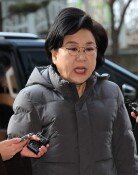Reasons behind Cheong Wa Daes Strong Stance
Reasons behind Cheong Wa Daes Strong Stance
Posted May. 06, 2005 23:25,
Cheong Wa Daes statement on May 6 that stated that with regards to rank-and-file prosecutors collective backlash against a revision of the Criminal Procedure Law, it will counter their act in accordance with law and principles is strongly interpreted as an advance warning for a nationwide rank-and-file prosecutors meeting that has been driven by the rank-and-file prosecutors themselves.
This also means that Cheong Wa Dae has regarded the adjusted bill drawn by Co- Chairman of the Presidential Committee on Judicial Reform (PCJR) Han Seung-hun and Minister of Justice Kim Seung-gyus acceptance of some views from the prosecution on the night of May 3 as a bottom line that is capable of being deliberated and adjusted.
On May 4, the day after Co-Chairman Han and Minister Kim came to an agreement over the issue, rank-and-file prosecutors mounted an opposition action similar to disobedience to orders and have pushed for a meeting to be attended by rank-and-file prosecutors from all over the country. Cheong Wa Dae believes that if the nationwide rank-and-file prosecutors meeting were to be held, the matter would be highly likely to fall into an uncontrollable situation. In the case where the situation actualized, there would be no choice but to hurtle toward a battle between the incumbent administration and the entire prosecution organization.
Accordingly, Cheong Wa Daes remark represents its firm determination to prevent a recurrence of a prosecutors uprising that occurred in March 2003; the early days of the government.
It is not common that Cheong Wa Dae emphasizes that it should tackle the issue in accordance with the law and principles. Concerning the prosecutors opposition, a core official of Cheong Wa Dae said, Prosecutors are also classified as public servants, implying that if additional collective action occurs, disciplinary measures would be taken according to related regulations such as the National Public Service Law or the Public Prosecutors Office Law.
It is conveyed that such a strong stance of Cheong Wa Dae has reflected President Roh Moo-hyuns will well. Also, it was made public that President Roh has viewed the prosecutors backlash as an egoism by the prosecution and a measure to maintain their vested rights.
It seems that President Roh has thought that the prosecutors have behaved rambunctiously, as in his dialogue with rank-and-file prosecutors in March 2003, in which he said to prosecutors, Does carrying out such an action mean that you would act rudely?
Jung-Hun Kim jnghn@donga.com







